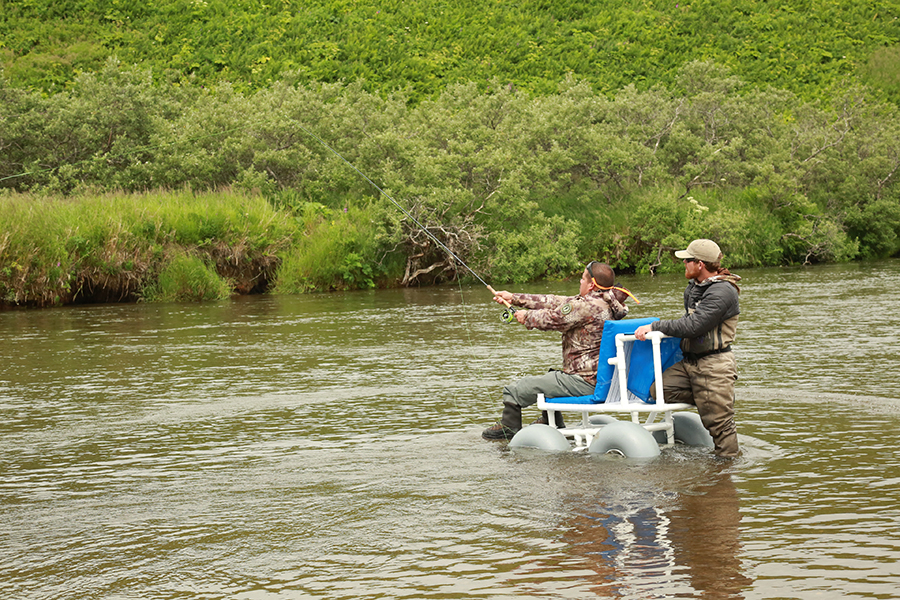The bear was less than 400 yards away.
It was May 2012, and Matt Amos was on a group hunt in British Columbia. It was only the second bear he’d seen in the last few days, and he knew that if he could walk quietly to a boulder about 200 yards away, he could take a shot.
There was only one problem.
Amos, who had enlisted with the United States Marine Corps in 2003, was injured twice overseas, first suffering facial injuries in Iraq and then losing both of his legs — one above the knee and one below — on re-deployment in Afghanistan. The sergeant had used a wheelchair since becoming a double amputee in 2011.
To reach the rock he would have to use his first set of prosthetic legs, which he had only had for about a month.
“At that time, all I’m focused on is that bear,” he recounted, “not how uncomfortable my sockets are or looking at that uneven terrain. I’m not worried about any of that.”
For the first time since being injured, Amos got out of his chair, walked for an extended period of time and shot the bear.
This experience, which he described as “an awakening” for his recovery, was facilitated by Wounded Warrior Outdoors.
Ron Raboud founded the organization in 2006 and is now exploring the possibility of basing operations out of Columbia Falls, where he recently purchased the Gentry River Ranch. The son of a wounded warrior and the cousin of a warrior killed during the Vietnam War, Raboud partially attributed WWO’s establishment to his guilt over never having served in the military.
“All my life I’ve watched the struggles wounded warriors face, but I don’t know that I ever really understood it growing up,” he said.
Raboud began by hosting therapeutic adventures on his own property, but eventually, at the behest of his lawyer, he met and partnered with several U.S. military medical facilities to facilitate supervised programs for wounded servicemen and women.
Under this partnership, medical staff select veterans to benefit from the trips and set short-term recovery goals for potential participants. Only the warriors who fulfill the stipulated requirements are able to take part in the fully funded adventures.
“It’s not just free trips,” Raboud said. “There’s a method to the madness.”
The selected warriors first engage in group exploits, which typically consist of six warriors plus medical staff and WWO volunteers.
According to Chris Denham, a volunteer who has been with WWO since the first adventure, volunteers must create a climate in which they are “ignoring the injury, but acknowledging the injury at the same time” to challenge warriors with situations they can conquer, and they have to foment a “sense of normalcy.”
After the group adventure, warriors may be selected to participate in more focused one-off experiences through which WWO can tailor the challenges to the individuals. Amos has taken part in a number of these adventures and is preparing to climb mountains in New Zealand next year.
Amos has also worked with the organization as a warrior liaison and formulated the idea for its online videos, Adventures Enabled (of which Amos is now a co-host and Denham is an executive producer). Inspired partly by his experiences with other warriors who are dealing with “mental injuries, invisible injuries,” the series aims to reach wounded warriors and similarly injured people who may not have access to or knowledge of the program.
Raboud added that the show allows servicemen and women to tell their own stories and, like the adventures, can help them to reconnect with their “warrior brothers and sisters.”
Having already planned 14 group trips and budgeted 25 one-off trips for 2018, WWO is examining how suitable Northwest Montana is for future adventures. Citing the fact that the organization largely relies upon private land to maintain a controlled environment during an expedition, Raboud said he and other volunteers will spend the rest of the summer and early fall testing different excursions and learning about the community.
He said, however, he is optimistic about the possibilities in the region.
“We’re here by choice because of the spectacular nature of the area,” Raboud said. “How can you live here and not be motivated?”
